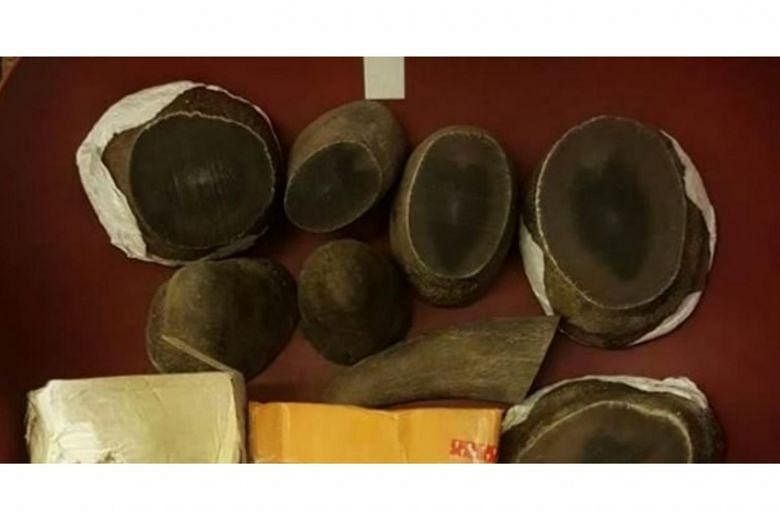SINGAPORE - A Vietnamese construction worker was on transit at Changi Airport when eight pieces of cut rhinoceros horns and a packet of powdery substance were found in his two luggage bags.
On Monday (Feb 26), Nguyen Vinh Hai, 29, who was transiting to Luang Prabang, Laos, was sentenced to 15 months' jail for importing these items from Angola without a permit.
On Aug 31 last year, acting on a tip-off, Air Checkpoints Branch customs officers stopped Hai and escorted him to a holding room at Terminal 2, said Agri-Food and Veterinary Authority (AVA) prosecutor Edwin Ignatious M.
Among Hai's luggage, officers recovered five gift boxes containing eight pieces of cut horns weighing 2.98kg. They were wrapped in thin translucent plastic and aluminium foil.
The matter was referred to AVA for investigation.
While checking the two luggage bags, AVA officers found a plastic packet of powdery substance weighing 17.68g. It was wrapped in aluminium foil and waste paper, and stuffed in footwear in one of the bags.
The cut horns were derived from three horns and from at least two black rhinoceroses, the court heard.
Mr Ignatious sought a stiff sentence of at least 15 months' jail. He said Hai's acts brought adverse reputation to Singapore as a transhipment hub for illegal wildlife, and that such offences were difficult to detect.
Citing data from the International Union for Conservation of Nature, Mr Ignatious said the black rhinoceros population has been declining by an estimated 97.6 per cent since 1960. There are now fewer than 5,000 black rhinoceroses in the wild, he added.
The decline is largely due to unrelentless poaching for the rhinoceros horn trade. The horn is believed in the traditional Chinese medicine community to be a cure-all for many ailments, said Mr Ignatious.
He added that based on a reported rate of about US$65,000 (S$86,000) per kg, the value of the seized horns of 3.15kg in this case can potentially fetch up to almost US$204,750.
Mr Ignatious said Singapore's sheer volume of passenger traffic - more than 50 million passengers a year - makes it easy for the Republic to be used as a conduit or staging area for the smuggling of endangered species into Singapore and to other parts of the world.
Hai, who is divorced, said in mitigation that he has to look after his parents and an eight-year-old child in Vietnam. Pleading for a lighter sentence, he said he was remorseful for what he had done.
He pleaded guilty to importing derivatives of a scheduled species from Angola without a permit under the Endangered Species (Import and Export) Act.
District Judge Shaiffudin Saruwan backdated Hai's sentence to Sept 6 last year.
The maximum penalty for the offence is a $50,000 fine for each scheduled species, not exceeding a total of $500,000, and two years' jail.

